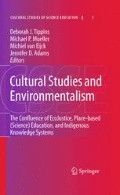Abstract
We live in a world of immense power, beauty, and wisdom. Every living and nonliving entity that occupies this planet, including humans, participates in an infinitely complex set of shifting, communicating relationships that create everything, making life possible. And while humans may desire to understand it all, there is no possible way to ever fully uncover or control all the resulting mysteries that circulate here. This is the meaning of the sacred.
Though we have life, it is beyond us.
Wendell Berry
Access this chapter
Tax calculation will be finalised at checkout
Purchases are for personal use only
References
Apffel-Marglin, F., with PRATEC. (1998). Spirit of regeneration: Andean culture confronting western notions of development. London/New York: Zed Books.
Bateson, G. (1972). Steps to an ecology of mind. Chicago: University of Chicago Press.
Berman, M. (1981). The reenchantment of the world. Ithaca: Cornell University Press.
Berry, W. (2000). Life is a miracle: An essay in modern superstition. Washington, DC: Counterpoint.
Bowers, C. A. (1997). The culture of denial: Why the environmental movement needs a strategy for reforming universities and public schools. Albany: State University of New York Press.
Bowers, C. A. (1999). Changing the dominant cultural perspective in education. In G. Smith & D. Willams (Eds.), Ecological education in action: On weaving education, culture, and the environment (pp. 161–178). Albany: State University of New York Press.
Bowers, C. A. (2006). Revitalizing the commons: Cultural and educational sites of resistance and affirmation. Mahwah: Lawrence Erlbaum.
Bowers, C. A. & Martusewicz, R. (2008). Eco-Justice pedagogy and the revitalization of the commons. In E. Provenzo Jr. (Ed.), Encyclopedia of the social and cultural foundations of education (Vol. 1, pp. 272–279). New York: Sage.
Gruenewald, D. A., & Smith, G. A. (2008). Place-based education in the global age: Local diversity. New York: Lawrence Erlbaum/Taylor & Francis.
Haymes, S. N. (2001). “Us ain’t hogs, us is human flesh”: Slave pedagogy and the problem of ontology in African American slave culture. Educational Studies, 32, 129–157.
Longboat, D. R., Kulnieks, A., & Young, K. (2009). Beyond dualism: Toward a transdisciplinary indigenous environmental studies model of environmental education curricula. The Ecojustice Review, 5. Retrieved September 15, 2009, from www.ecojusticeeducation.org
Martusewicz, R. (2009). Educating for “collaborative intelligence”: Revitalizing the cultural and ecological commons in Detroit. In M. McKenzie, H. Bai, P. Hart, & B. Jickling (Eds.), Fields of green: Re-storying education (pp. 253–270). Cresskill: Hampton Press.
Martusewicz, R., & Edmundson, J. (2005). Social foundations as pedagogies of responsibility and eco-ethical commitment. In D. W. Butin (Ed.), Teaching social foundations of education: contexts, theories, and issues (pp. 71–92). Mahwah: Lawrence Erlbaum.
Merchant, C. (1980). The death of nature: Women, ecology, and the scientific revolution. San Francisco: Harper Collins Publishers.
Nettle, D., & Romaine, S. (2000). Vanishing voices: the extinction of the world’s languages. Oxford/New York: Oxford University Press.
Norberg-Hodge, H. (1991). Ancient futures: Learning from Ladakh. San Francisco: Sierra Club Books.
Plumwood, V. (2002). Environmental culture: The ecological crisis of reason. London: Routlege.
Shiva, V. (1993). Monocultures of the mind. Perspectives on biodiversity and biotechnology. London: Zed Books.
Shiva, V. (2000). Stolen harvest: The hijacking of the global food supply. Cambridge: South End Press.
Author information
Authors and Affiliations
Editor information
Editors and Affiliations
Rights and permissions
Copyright information
© 2010 Springer Netherlands
About this chapter
Cite this chapter
Martusewicz, R.A., Lupinacci, J., Schnakenberg, G. (2010). EcoJustice Education for Science Educators. In: Tippins, D., Mueller, M., van Eijck, M., Adams, J. (eds) Cultural Studies and Environmentalism. Cultural Studies of Science Education, vol 3. Springer, Dordrecht. https://doi.org/10.1007/978-90-481-3929-3_3
Download citation
DOI: https://doi.org/10.1007/978-90-481-3929-3_3
Published:
Publisher Name: Springer, Dordrecht
Print ISBN: 978-90-481-3928-6
Online ISBN: 978-90-481-3929-3
eBook Packages: Humanities, Social Sciences and LawEducation (R0)

